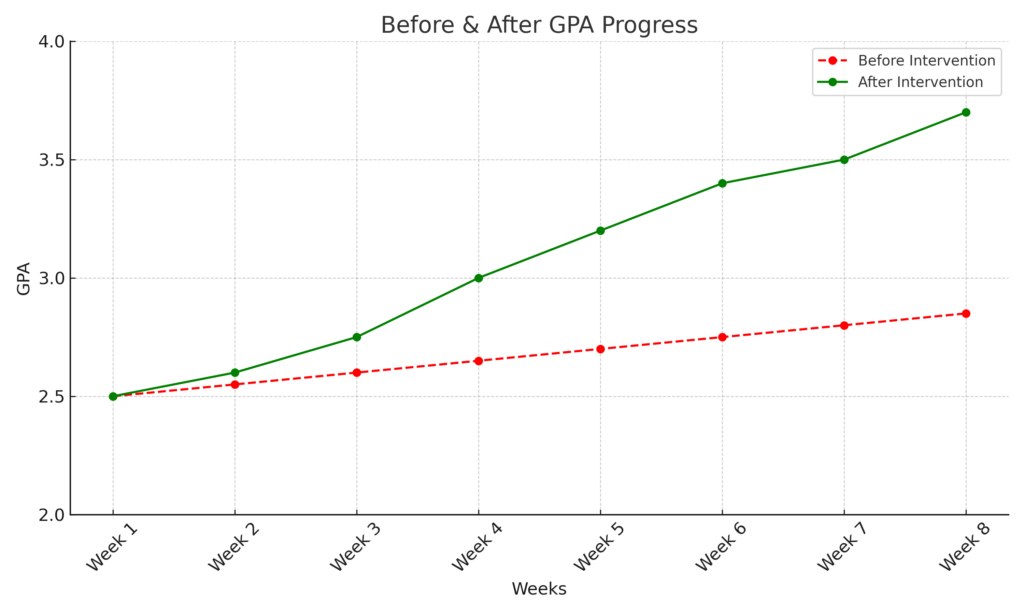Can You Really Raise Your GPA Before It’s Too Late? You just checked your grades, and your heart sank—your GPA isn’t where you need it to be. Maybe you’ve fallen behind on assignments, struggled on a few tests, or simply didn’t focus as much as you should have. Now, the semester is almost over, and you’re wondering: Is it even possible to improve my GPA this late?
The answer? Yes—but only if you act fast and strategically.
What You’ll Learn in This Guide
In this article, you’ll discover:
Quick fixes that can boost your GPA in the final weeks.
Smart study strategies to ace your remaining exams.
How to ask for extra credit (without sounding desperate).
A 7-day action plan to make the most of the time you have left.
Don’t panic! Whether you need to push your GPA from a 2.5 to 3.0 or just want to secure the best possible grades, this guide will walk you through every step.
🔹 Stay with me until the end for a free GPA Boost Planner to keep you on track!
Struggling with AP exam stress? Learn how to stay calm and focused during exams.
Understanding How Your GPA Works (So You Can Improve It Faster!)
If you want to raise your GPA before the semester ends, the first step is understanding how your grades are calculated. Many students assume their GPA is a simple average, but in reality, it’s heavily weighted by certain factors like final exams, major assignments, and course difficulty.
How GPA Is Calculated: High School vs. College
High School GPA: Most high schools use a 4.0 scale, where an A = 4.0, B = 3.0, and so on. Some schools use a weighted GPA (5.0 scale) for AP/honors classes.
College GPA: Uses a credit-hour system, meaning some courses impact your GPA more than others (e.g., a 4-credit math class affects GPA more than a 1-credit elective).
Quick Tip: Use an online GPA calculator (or your school’s grade portal) to predict how different grades will impact your final GPA!
If you want a focused strategy to improve your cumulative GPA quickly, this guide can help.
What Matters More: Exams, Homework, or Class Participation?
Your final grade isn’t just an average—it’s calculated based on the weight of each assignment:
| Category | Weight (%) | Impact on GPA |
|---|---|---|
| Final Exams | 40-60% | 🚀 Biggest impact – A high score can significantly boost your grade. |
| Homework | 10-30% | 📌 Consistently completing homework helps keep grades stable. |
| Projects/Papers | 20-40% | ✍️ Important in subjects like English & History. |
| Class Participation | 5-20% | 🎤 Easy way to earn extra points – Speak up in class! |
Tip: Check your syllabus NOW to see which categories count the most, then prioritize where to put in extra effort.
Not sure how GPA calculations work? Learn how your GPA is determined here: Understand GPA calculations to strategize your improvement!
This final grade calculator tool shows what scores you need to boost your GPA.
Weighted vs. Unweighted GPA – Why It Matters for Improvement
Not all GPAs are calculated the same way. If you’re taking AP, IB, or honors classes, you might be on a weighted GPA scale.
Unweighted GPA (4.0 scale): All classes are treated equally.
Weighted GPA (5.0 scale): Honors, AP, or IB courses earn extra points.
Example:
| Class | Grade | Unweighted GPA | Weighted GPA (AP/IB Class) |
|---|---|---|---|
| Math (Honors) | A (95%) | 4.0 | 5.0 |
| Science | B (85%) | 3.0 | 3.0 |
What You Can Do:
- If you’re struggling in an AP/honors course, see if it’s worth keeping or switching to a regular class for an easier A.
- If possible, aim for extra credit opportunities in AP/IB classes—they can raise your weighted GPA.
For information read our guide on Weighted vs. Unweighted GPA.
How Different Assignments Impact Your Final Grade
Not all assignments carry the same weight. Exams, quizzes, homework, and participation all play a role in your GPA, but some have a much bigger impact than others.
Example: How a Final Exam Can Change Your Grade
Let’s say you have a B (85%) in a math class, and the final exam is worth 40% of your grade.
Impact of Final Exam Scores on Overall Grade
Scenario: A student has a B (85%) in a math class before the final exam. The final exam is worth 40% of the total grade.
| Final Exam Score | Grade Before Final (85%) | Final Grade After Exam | Letter Grade |
|---|---|---|---|
| 50% (Failing Grade | 85% | 71% | C- |
| 70% (Below Average ) | 85% | 79% | C+ |
| 80% (Decent ) | 85% | 83% | B- |
| 90% (Good ) | 85% | 89% | B+ |
| 95% (Great! ) | 85% | 91% | A- |
| 100% (Perfect! ) | 85% | 94% | A |
Key Takeaways from the Chart:
✅ A failing final exam (50%) could drop a student’s grade from a B (85%) to a C- (71%)!
✅ Scoring a 90%+ on the final could boost the grade from a B (85%) to an A (91%) or higher!
✅ Even a small improvement (e.g., 10% higher on the final) can make a difference in the final grade.
How to Use This Chart:
- If your final is worth a large portion of your grade, prioritize studying for it.
- If you’re borderline between two grades, aim for a high final exam score to push you into the next grade bracket.
- Use grade calculators to predict what score you need for your desired GPA.
If you score a 95% on the final, here’s the impact:
Final Grade Calculation:
(Current grade × 60%) + (Final exam × 40%)
(85 × 0.6) + (95 × 0.4) = 51 + 38 = 89% (Still a B!)
Solution? To ensure you reach an A (90%) or higher:
- Boost homework/project scores NOW before the final.
- Ask for extra credit assignments (even small points add up!).
- Improve participation – many teachers round up borderline grades for engaged students.
Maximizing GPA with Extra Credit & Smart Course Adjustments
Many students overlook easy ways to raise their GPA without retaking classes.
✅ Ask about extra credit NOW – Teachers are more likely to offer it midway through the semester rather than at the end.
✅ Improve attendance & participation – If class participation is graded, start asking questions and contributing.
✅ Retake tests (if allowed) – Some teachers offer test corrections or drop the lowest test score.
✅ Drop a difficult class (if it helps) – If your school allows late drops, removing a failing grade might improve your GPA.
Self-studying for an AP exam can be a great way to improve your transcript. Learn how to study independently and score a 5 with our expert guide.
Final Thoughts: Your GPA Isn’t Set in Stone!
Raising your GPA before the semester ends is possible, but you need to act strategically. By understanding how grades are weighted, maximizing extra credit, and focusing on high-impact assignments, you can boost your GPA fast—even if you only have a few weeks left.
Next Steps:
- Track your current grades using a GPA calculator.
- Ask teachers for extra credit or grade recovery options.
- Prioritize studying for high-weighted assignments.
- Make sure all homework is submitted on time.
Quick Wins – Easy Fixes to Improve Your GPA Before the Semester Ends
If you’re worried about your GPA dropping before the semester ends, don’t panic. There are still high-impact strategies you can use to salvage your grades and boost your GPA fast. The key is to focus on quick, effective fixes that make the biggest difference in the shortest time.
Complete Any Missing Assignments ASAP!
Can late work still be accepted? YES – if you approach it the right way.
Many teachers accept late assignments with penalties, but some may waive deductions if you explain your situation properly. Even partial credit on missing work is better than a zero.
How to Ask for Late Work Extensions (Email Template)
Subject: Request for Late Assignment Submission Opportunity
Dear [Professor/Teacher’s Name],
I hope you’re doing well. I recently realized that I missed the submission for [Assignment Name] due to [brief reason, e.g., illness, personal emergency]. I take full responsibility and was wondering if there’s any way I can still submit it for partial or full credit.I value this class and want to make sure I finish strong. I understand any late penalties that may apply and will submit it immediately if granted an extension. Thank you for your time and consideration.
Best,
[Your Name]
Actionable Steps:
✅ Check your online grade portal and list any zeros or missing work.
✅ Email teachers today—be polite, take responsibility, and ask for a chance.
✅ Prioritize assignments with the highest weight (e.g., essays, projects).
Messed up on a section? Don’t panic — you can still improve your GPA fast with some smart end-of-semester strategies.
Ace Your Remaining Tests & Quizzes – Study Hacks That Work
Even if you’ve struggled all semester, your final exams and quizzes can significantly boost your GPA if you perform well.
High-Yield Study Methods That Actually Work
Spaced Repetition: Instead of cramming, review material daily in short bursts. Apps like Anki or Quizlet help.
Active Recall: Instead of passively rereading notes, quiz yourself—this forces your brain to remain information.
The Feynman Technique: Explain concepts in your own words, like teaching a 5-year-old. This reveals gaps in your understanding.
Example: Quick Study Schedule for a Test in 7 Days
| Day | Task |
|---|---|
| Day 1-2 | Review notes & create flashcards. |
| Day 3-4 | Practice active recall (self-quizzing, teaching a friend). |
| Day 5 | Do past exams or sample questions. |
| Day 6 | Identify weak areas & focus study there. |
| Day 7 (Test Day) | Quick morning review, stay calm & confident! |
Exam Strategy Tip: Many professors weigh final exams more heavily—even a 5-10% improvement can raise your final grade by an entire letter!
Participate More – Easy Grade Boost Without Extra Work
Class participation is often an easy way to boost grades with minimal effort. If your teacher includes participation in grading, a little effort can nudge you up a full letter grade.
How to Participate More (Without Being Annoying)
✅ Ask thoughtful questions – Show engagement, but don’t force random comments.
✅ Engage in discussions – Even 1-2 contributions per class can help teachers notice you.
✅ Use office hours – Even if you don’t need help, checking in makes a good impression.
Case Study: How One Student Raised Their Grade from B to A- Just by Participating
- Before: James had an 85% (B) in English, and class participation was worth 10%.
- Action: He started asking one question per class and attended office hours twice.
- Result: His participation grade went from 7/10 to 10/10, giving him the extra boost to reach an A-!
Quick GPA Boost Tactics – Before & After Impact Analysis
| Tactic | Why It Works | Before Grade | After Grade | GPA Impact |
|---|---|---|---|---|
| Submit Late/Missing Assignments | Many teachers allow partial credit for late work. Completing them can bump your overall score. | 68% (D) | 76% (C) | 📈 Raises final grade, prevents failing |
| Score Higher on Final Exams | Finals often carry the most weight—small improvements make a big difference. | 72% (C-) | 85% (B) | 📈 Can boost GPA by 0.3+ points |
| Retake Low-Scoring Quizzes | Some teachers allow retakes, replacing old scores. | 75% (C) | 83% (B-) | 📈 Small but effective GPA increase |
| Ask for Extra Credit | Extra assignments can add crucial points, especially if you’re on the edge of a higher grade. | 78% (C+) | 88% (B+) | 📈 Can push borderline grades up |
| Boost Class Participation | Many courses factor in participation—simple engagement can add easy points. | 80% (B-) | 90% (A-) | 📈 Easy way to push GPA without extra work |
| Use Office Hours & Tutoring | One-on-one help can clarify concepts, leading to better test performance. | 79% (C+) | 87% (B) | 📈 Strong improvement in comprehension and grades |
Actionable Takeaway: Focus on high-weighted tasks (finals, missing assignments, extra credit) first to maximize your GPA boost before the semester ends! 🚀
Final Thoughts: The Power of Smart Fixes
You don’t have to redo an entire semester to improve your GPA—you just need to make smart, high-impact moves now.
Your Next Steps:
✅ Make a list of missing assignments & email teachers today.
✅ Plan a study schedule for upcoming tests using spaced repetition.
✅ Start participating in class (even small efforts add up!).
✅ Check if you can do extra credit—every point counts!
Looking for more long-term GPA strategies? Check out these expert-backed tips: Explore proven GPA improvement techniques for high school and college students!
How to Raise Your GPA Strategically in the Last Few Weeks
If time is running out, you need a high-impact strategy to improve your GPA fast. These advanced tactics can help you secure extra points, improve weak grades, and make smart course adjustments before final grades are locked in.
Talk to Your Teachers – Can You Improve Your Grades With Extra Credit?
Many students hesitate to ask for extra credit, but teachers often allow grade recovery opportunities—especially if you show effort and genuinely want to improve.
How to Ask for Extra Credit (Without Sounding Desperate)
🔹 Timing Matters: The earlier you ask, the better—don’t wait until the last week.
🔹 Be Respectful & Professional: Instead of asking, “Can I get extra credit?”, say:
- “I’ve been working hard in this class, and I’d love a chance to demonstrate my understanding. Are there any assignments or projects I could complete to improve my grade?”
🔹 Follow Through: If a teacher gives you an extra assignment, complete it on time and with quality work.
Pro Tip: Some teachers allow test retakes, additional essays, or participation-based points—always ask!
Leverage Tutoring & Study Groups – Learn Smarter, Not Harder
A few focused tutoring sessions can make the difference between a C and a B—or even a B and an A. The key is targeting weak areas quickly and using effective study methods.
Best Free Tutoring & Study Resources
✅ School Tutoring Centers: Many schools have peer tutoring programs—check with your academic advisor.
✅ Online Free Tutoring:
- Khan Academy (math, science, history)
- Wyzant & Chegg Tutors (some free resources)
- YouTube (search “[Your Subject] Crash Course” for quick lessons)
✅ Study Apps: - Quizlet – Create digital flashcards
- Anki – Spaced repetition for better memory
- Forest App – Stay focused while studying
Actionable Tip: Form a study group with motivated classmates. Research shows collaborative learning can improve retention by up to 50%!
Drop a Low-Grade Class (If It Helps Your Overall GPA!)
If a low grade is dragging down your GPA, dropping the class might be a smart move—but only in certain cases.
✅ When Should You Drop a Class?
- Your current grade is too low to recover, even with extra effort.
- The class isn’t required for your major or graduation.
- Dropping it will free up time to focus on other courses.
Before Dropping, Consider:
- Will it affect full-time student status? (Check with your school.)
- Will it impact financial aid or scholarships?
- Would a pass/fail option be available instead of a full drop?
Pro Tip: Talk to your academic advisor before making a decision.
Case Studies – How These Students Increased Their GPAs in One Semester
Sometimes, the best motivation comes from real students who turned things around. These success stories show how small changes can lead to big GPA improvements.
Case Study 1: Raising a 2.5 GPA to 3.0 with Tutoring & Test Retakes
Background: James, a high school junior, struggled with math and science, bringing his GPA down to 2.5.
Challenges:
- Poor test performance in Algebra II and Chemistry.
- Didn’t take advantage of tutoring resources.
Strategies Used:
✔ Started weekly tutoring for math—focused on weak areas.
✔ Retook two major tests (teacher allowed second attempt).
✔ Used active recall & flashcards instead of passive rereading.
Results:
⬆ Final GPA: 3.0 – Improved math grade from C to B+, helping overall GPA.
Case Study 2: From Failing Grades to B’s Using Study Hacks & Office Hours
Background: Sarah, a college freshman, had a 1.9 GPA after her first semester.
Challenges:
- Missed assignments & late submissions.
- Weak study habits (cramming, distractions).
Strategies Used:
✔ Attended office hours for each class, asking for study tips.
✔ Used the Pomodoro study method (25-minute focus sessions).
✔ Completed extra credit assignments in psychology & history.
Results:
Final GPA: 2.8 – Not perfect, but a major recovery in just one semester!
Key Takeaways from These Success Stories
Lesson 1: Small changes = big results (tutoring, test retakes, and office hours matter).
Lesson 2: Time management beats cramming – study smarter, not harder.
Lesson 3: Extra credit is underrated – always ask!
Student GPA Progress Chart: Before & After Improvement
This chart illustrates how students’ GPAs improved over eight weeks using study strategies, tutoring, and extra credit opportunities. Even small, consistent efforts can lead to significant GPA gains!

Final Thoughts: You Control Your GPA’s Future!
Improving your GPA before the semester ends requires strategy, action, and consistency. Whether you’re asking for extra credit, using tutoring resources, or making smart course decisions, the key is to act now.
Next Steps:
✅ Pick 2-3 strategies from this guide and apply them this week.
✅ Talk to your teachers about grade recovery options.
✅ Use a GPA calculator to track progress and set goals.
Your GPA isn’t set in stone—start improving it today!
FAQs on Improving Your GPA Fast
Students often have urgent GPA-related questions, especially when the semester is almost over. Here are clear, data-backed answers to common concerns.
Can I Raise My GPA from 2.5 to 3.0 in One Semester?
It depends on your credit load and grades left to earn.
High School: Focus on acing finals, extra credit, and retakes if allowed.
College: If taking 15+ credits, mostly A’s and B+’s can make a difference.
Tip: Use a GPA calculator to see realistic improvement.
What’s the Fastest Way to Boost My GPA Before Finals?
✅ Ace final exams (often worth 40-60%).
✅ Ask for extra credit ASAP.
✅ Submit missing work (a late grade > zero).
✅ Join study groups & get tutoring for weak subjects.
✅ Boost class participation if it’s graded.
Do Extra Credit Assignments Really Help?
Yes! Even a small boost (2-5%) can push a B+ to an A-.
Pro Tips:
Ask about extra credit now—before deadlines.
Redo past assignments or tests if possible.
Engage more in class for participation points.
How Can I Fix My Low GPA in High School?
✅ Start Early – Freshmen and sophomores have time to recover.
✅ Prioritize Big Grade Boosters – Finals, projects, and homework corrections.
✅ Use Grade Replacement Options – Retake failed classes if allowed.
✅ Seek Help – Tutoring, study groups, and teacher feedback.
✅ Stay Consistent – Small improvements add up over time.
How Can Fix My GPA Help? (Be Aware of GPA ‘Fixing’ Services)
Caution: Some “Fix My GPA” services offer unethical solutions (e.g., completing coursework for students). Instead, focus on legitimate ways to improve:
✔️ GPA calculators to plan realistic goals.
✔️ Time management strategies to stay on track.
✔️ Retaking courses or improving future performance.
How Do I Improve My GPA?
Step 1: Assess your current standing (use a GPA calculator).
🔹 Step 2: Set specific grade goals for each subject.
🔹 Step 3: Find high-impact improvements (finals, extra credit, homework).
🔹 Step 4: Use active study techniques (spaced repetition, note-taking).
🔹 Step 5: Stay consistent—avoid cramming before exams.
How Do I Know If My GPA Goal is Achievable?
Use a GPA calculator to see if your goal is realistic.
Example:
If you have a 2.5 GPA and need a 3.5 GPA, how many A’s do you need?
Consider course weight (AP/Honors boost GPA more than regular classes).
If it’s too late, focus on standardized tests (SAT/ACT) or extracurriculars for college applications.
Raising your GPA fast is possible—but strategy matters.
Is your school using a competency-based grading system? Learn how it affects GPA. Find out how alternative grading systems impact your academic performance!
Related Posts You Might Like
- Improve Cumulative GPA Fast
Short- and long-term strategies to boost your overall GPA quickly and efficiently. - Improving Your GPA: Tips for High School & College Students
Actionable tips tailored for both high schoolers and college students to stay on top of their academic game. - Top Free Grade Calculator Tools for Students & Teachers
Know what scores you need with easy-to-use GPA and grade calculators. - Best Study Planners for Students
Organize your schedule to maximize productivity and stay focused during crunch time. - Understanding GPA: Guide for High School & College
A complete breakdown of GPA types, how they’re calculated, and what they mean for your future.

Nawab, an educator teaching K-12 since 2010, holds an English honors graduate degree and a diploma in elementary education. He has also been blogging for five years, sharing insights for educators and parents.

